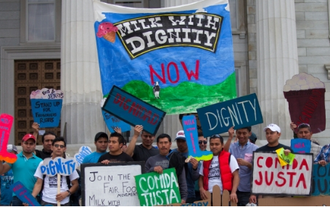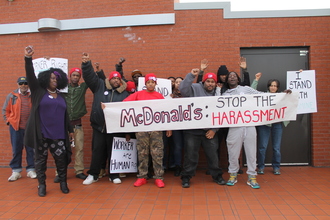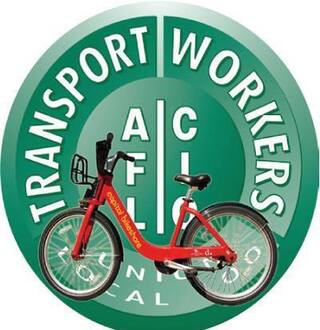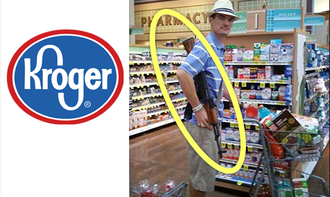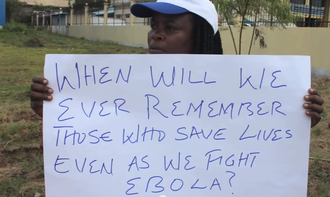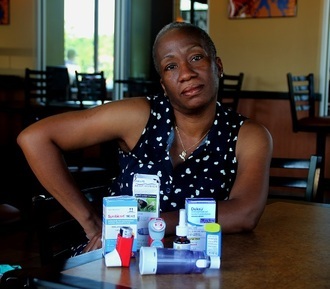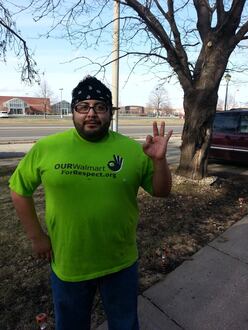-
Coffee Tree: Stop Violating Basic Workers' RightsThis is a cry for workplace fairness at Coffee Tree. Employers have been utilizing intimidation tactics, shaming and manipulation, and retaliation to rob workers of their basic rights for too long, often taking advantage of employees' lack of familiarity with these work laws. Now is the time to cease these activities. Outlined below are the concerns and clear violations of workers' rights: STOP DENYING PAID REST BREAKS. (Under the ES.C.6 Meal and Rest Periods - Employees are entitled to a minimum 10 minute rest break for each 4 hours worked. The rest period of time must be scheduled as near as possible to the midpoint of the four hours of working time. No employee may be required to work more than three consecutive hours without a rest period). Employers have been exploiting the loophole ("if the nature of the work involves several intermittent rest periods equal to ten minutes, a rest break is not required") to deny workers a 10, even when workers have been working continuously. It's also important to note that the ES.C.6 specifies that a series of ten 1-minute breaks is not sufficient to meet this requirement. Many of us will experience shifts where we work longer hours than we were scheduled for, work continuously, and are entitled to a ten minute break but are either not made aware of this right, or are strongly discouraged from exercising this right. The restructuring of a workers' schedule into double 3.9 hr shifts as punishment for insisting on his or her 10 minute break, while not unlawful, is cheap and abominable. This redesigning not only limits the overall breaks for an employee during an entire workday, but also results in less employee satisfaction and production. Similarly, comparative shaming as a tool to discourage one or more employees from taking rest breaks creates a negative environment where employees don’t feel valued or secure. Employers must honor the work and time of an employee as evidenced in person or in surveillance which entitle the worker to his/her paid break. STOP TRYING TO RESTRICT BATHROOM ACCESS. According to DOSH, restroom breaks cannot be restricted (within reason) and do not count as a paid 10 minute rest break, though employees may choose to use the bathroom on their paid break. This is a basic health and safety right. Intimidating workers by recording length of bathroom breaks and using it as negative commentary in an employee file is despicable. STOP RETALIATING AGAINST EMPLOYEES ADVOCATING FOR THEIR RIGHTS. Concerted activity (activity done to address health/safety concerns or to improve the workplace conditions) is protected from acts of retaliation (firing, cutting of hours, creating unnecessary write-ups, wage/tip deduction). As an employee currently suffering a suspension from positive workplace actions, I am pushing for awareness that this action is not appropriate or legal. STOP UNLAWFUL WAGE DEDUCTIONS. In the training phase, we are told that cash drawer shortages, damage to the store, or excessive waste will result in our wages or tips being garnished to fill those losses. According to the Washington State Legislature (WAC 296-126-025): The only time a workers’ income (hourly wage and tips) should be garnished is with court orders, with a personal agreement with keeping a tab in the workplace, a loan, or some other extenuating circumstance. Cash shortages in tills, and accidental waste/breakage are specifically pointed out as being unlawful reasons for wage deduction. In addition, the employers have never been held accountable and continue to seize half of worker earned tips for themselves. Under FLSA, managerial and professional positions are not eligible to take a cut of tips from tipped employees. Coffee Tree employers must observe these laws, return money unlawfully taken from employees in the past, and cease this procedure altogether. Protecting quantifiable losses of the stores (time and money) at the expense of the businesses' most valuable commodity, the workers, is not lawful or virtuous. Let us strive not only for great coffee and customer care, but also great care of employees. Let us recognize when breaks are warranted. Let us thrive together.300 of 400 SignaturesCreated by Jhenn Whalen
-
Fight for FightersMMA is the fastest growing sport in the world. Mixed Martial Artists should be treated like professional athletes. Fighters should have the right to know how much money a promotion is making from an event. Fans should have the right to see the best possible fights through independent rankings. Extending the Ali Act to MMA would help professionalize the sport & stop the conflicts of interests that currently exist in the sport.3,030 of 4,000 SignaturesCreated by Brian Shepherd

-
Ben & Jerry's: Stand Up For Farmworkers’ RightsIn the Vermont dairy industry, forty percent of dairy workers receive less than the VT minimum wage and twenty percent have their first wages withheld--this is wage theft. Thirty percent have to work seven or more hours without a break to eat, and the same number have had mostly preventable workplace injuries or illnesses. Many workers work 12-14 hour days without a day of rest, and significant numbers live in deplorable housing conditions. This is an unacceptable state of affairs for any supply chain, but it is particularly appalling to see this level of abuse in Ben and Jerry’s supply chain given the company's long standing commitment to social justice and corporate responsibility. The good news is we already know there is a solution that works and there are some farms that are demonstrating that dignified working conditions are possible. Migrant Justice is calling on Ben & Jerry's to create a worker-driven social responsibility program -- the Milk with Dignity Program -- fashioned after the globally acclaimed and highly effective Fair Food Program in Immokalee Florida. Many dairy farmers are also facing serious economic challenges and are in need of economic relief. The Milk with Dignity Program rewards those farms that have it right by having corporate participants pay more down the supply chain to both the farmer and the farmworker. We anticipate many farms to enthusiastically support this initiative. The Milk with Dignity program is in line with the mission of social responsibility on which Ben & Jerry’s has built its legacy, image, and financial success. Your customer base wants, and is already demanding, products that support dignified livelihoods for both farmworkers and farmers. The company has done this before for cows, consumers and the environment in its impressive work to eliminate RGBH from its supply chain. The company has done this for chickens with its commitment to cage-free eggs. Ben and Jerry's can do this for the workers facing inhumane workplace conditions while supplying the cream its company depends on. We urge Ben and Jerry's to sit at the table with VT dairy farmworkers to build a vibrant and much needed Milk with Dignity Program that respects workers leadership and ensures human rights in its dairy supply chain.2,765 of 3,000 SignaturesCreated by Enrique Balcazar

-
McDonald's: Managers Assaulting Workers Won't Be ToleratedTwo nights ago, after standing on my feet for hours during a late shift, I asked my shift manager who was coming in to replace me so I could finally go home and rest. My shift manager berated me and threatened me with violence saying he was going to hit me with the fry basket. I backed away but after the threats continued I firmly told him he needed to stop. Then he slapped me across the face in front of other workers. The next morning my General Manager and District Manager called me into their office, said they had watched the tape of the incident and told me, "He didn't hit you that hard" I am offended, outraged and disappointed that no one in management, even though they had watched the security tape of the assault, was taking it seriously. Letting my shift manager off the hook because he didn't draw blood or knock me out is beyond insulting.3,127 of 4,000 SignaturesCreated by Jasmine Lopez
-
Help Capital Bikeshare Employees Unionize!Having our members show their support for the employees of Capital Bikeshare is key; our main leverage is member relations - namely, you all. Having members sign the petition and show that they endorse the right of CaBi workers to unionize is huge. Please, tell Alta/REQX to voluntarily recognize the union we have formed with TWU Local 100 and to drop the motion to clarify, that is, allow everyone who wants to be in the Union a seat at the table. Thank you everyone to has signed the petition. However, it appears our work has just begun. At the NLRB hearing Jackson-Lewis successfully pushed our petition to unionize out. We are starting back from ground zero. We still need your support - letting them know that we, the public, those who use the bikes stand for workers rights will go a long way in our struggle. Thank You.883 of 1,000 SignaturesCreated by CaBi Workers
-
Woolworths: it's time for an injury free workplaceAccording to the Sydney Morning Herald, Woolworths warehouse workers are now officially working in Australia’s deadliest industry. We need real safety policies in Woolworths warehouses to ensure every worker goes home without injury. Workers are asking Woolworths, one of Australia’s best performing companies, to encourage a pro-active focus on safety, taking steps to implement industry-wide standards and best practices. Over the last few months, workers representatives at Woolworths from around Australia have been working together to discuss local and national health and safety issues. Unfortunately, workers in various facilities around the country have suffered back, shoulder and other injuries. Some workers will need to have ongoing treatment to live with these injuries. Woolworths health and safety standards can be insufficient, misunderstood or even simply ignored. They are often inadequate in protecting workers from harm. Woolworths warehouse workers do not yet have a national forum to adequately address health and safety matters in an effective and efficient manner. Now we want Woolworths senior management to meet with us to address and resolve our issues together. It's time for Woolworths to acknowledge this problem and support its employees in creating a national forum for safety on the job. Let's make all Woolworths warehouses safe places to work!821 of 1,000 SignaturesCreated by Keni Navusolo
-
Groceries, Not Guns at KrogerKroger spokesperson Keith Dailey has said that Kroger won’t prohibit open carry because: “[W]e don't want to put our associates in a position of having to confront a customer who is legally carrying a gun." But all too often, weak gun laws make it impossible to discern whether someone open carrying a gun in a grocery store is a responsible, law-abiding citizen or a person who poses a threat. Allowing open carry in stores is not in line with Kroger’s core values to provide a "safe and secure workplace and shopping environment." If our employer doesn’t want us in the position of having to confront customers openly carrying guns, they should enact a policy prohibiting such behavior. What’s more: Kroger doesn’t allow guns to be openly carried in its corporate headquarters in Cincinnati. Why do they allow it in other Kroger-owned workplaces? All Kroger employees—whether executives, managers, cashiers, or customer service representatives like me—deserve a safe workplace. Kroger should join the growing number of American businesses who have adopted policies to prevent open carry, including Starbucks, Target, Panera, Chipotle, Jack in the Box, Chilis, and Sonic. Please join me in asking Kroger to prohibit open carry of guns in its stores.72 of 100 SignaturesCreated by Mary Mueller
-
Help Liberian health care workers fight EbolaHere in Liberia, we are in an urgent cross-border fight to contain the deadly virus Ebola that is killing both health workers as well as our citizens. It’s believed to be the worst Ebola outbreak ever and has claimed the lives of hundreds of people with many more infected. The Ebola virus has penetrated 8 of the 15 counties in Liberia and is impacting many of our neighboring West African countries as well. We experienced some 14 years of civil war and crisis in Liberia that caused a serious brain drain in the health sector. Ebola is now threatening the lives of the few health workers we do have -- along with all of our citizens. The long-term impact on our health system could be devastating. Ebola is highly contagious and has a high mortality rate. Because it is spread through contact with body fluids, appropriate protective gear is absolutely critical to reducing the spread of the virus and ensuring that the health workers helping to treat the victims do not contract the virus. Health workers are dying daily because the Government of Liberia and its partners are not providing the necessary tools and gear to keep them safe. We need more technical, logistical (such as protective gear, tools and vehicles) and financial support. We're also concerned that families of health workers who die from Ebola are not being compensated for their loss, leaving their families to struggle after tragic loss. While we've been working with communities to raise funds for these families, we believe the government should do more to help. As health care workers on the frontlines of fighting Ebola, we’re asking you to join us in calling on the Government of Liberia to ensure that all health workers throughout all counties and districts of Liberia have the best protective gear and that families of health care workers are compensated for their losses.18 of 100 SignaturesCreated by Garlo Williams
-
Stop Walmart & Whole Foods from Sourcing Forced LaborMy name is Olivia Guzman. For 17 years, my husband Fausto and I have been coming to the U.S. each season from our hometown in Mexico as H-2B guestworkers. We worked with thousands of other guestworkers who process and pack seafood for big retailers like Walmart and Whole Foods. The guestworker visa requires us to work for only one employer. The name of our boss is inscribed in our passport, and if we are fired or leave to seek work somewhere else we can be detained and deported by ICE. Our employers paid us a piece rate—by the weight of seafood we cleaned—that often came out to be less than the minimum wage no matter how fast we worked. They housed us in decrepit labor camps on company property where snakes crawled up through cracks in the floor. Bosses and managers surveilled us in the camps, humiliated us, and even physically abused us. To keep us silent, they constantly threatened us with firing, deportation, and blacklisting so we could no longer find work as guestworkers. There comes a time you can’t take the abuse any more, and in spite of the threats, you have to speak up. I did that when I became of member of the National Guestworker Alliance (NGA). I traveled across the Gulf Coast and organized my fellow guestworkers into committees to try to change conditions in the industry. I traveled to Washington, DC, and Mexico City to tell political leaders about the abuse. But when I hosted NGA meetings in my house, the recruiter spied on us. She said we were all trouble makers and threatened to have us blocked from coming back to the United States. And I learned that the threats were real, because this year, my employer blacklisted me in retaliation for my organizing. I was removed from the employment list, accused of being a trouble maker, and blocked from coming back on an H-2B visa to my employer. Walmart says it wants to stop forced labor on its supply chain, but continues to buy from suppliers who abuse guestworkers every day. Whole Foods tells customers all about where its fish were caught, but not that the fish were packed by workers who were trapped in severe labor abuse. Walmart and Whole Foods set the standards that thousands of suppliers follow. My fellow NGA members and I are calling on them to sign the NGA’s Forced Labor Prevention Accord. The Accord is a binding agreement that would ban retaliation and blacklisting, ensure basic labor standards, and create a binding dispute resolution process that includes employers and workers. We are urging retailers to sign the Accord to ensure that their suppliers don’t trap guestworkers in exploitation and forced labor.7,633 of 8,000 SignaturesCreated by Olivia Guzman
-
Poisoned at my job in the auto industryI work at a plant in Selma, Alabama, operated by Renosol, a car parts manufacturer. We make foam for seats that are installed in Hyundai vehicles. Recently, NBC News ran a story about years of safety problems at our plant that have made me and many of my co-workers sick. Read it here: http://nbcnews.to/1jHg6vQ The current round of problems started on May 1, when workers at my plant in Selma were evacuated because of a chemical leak. When I arrived at work, management admitted there had been a leak. They put a “diaper” on the leak—some old rags and plastic—but said a more permanent repair would have to wait until Sunday. Even though workers said they were getting sick from the fumes, we still had to work all day Thursday and Friday. Some people even had to work a 12-hour shift on Saturday. The alarm went off again the next day, and several more times since. OSHA—the federal agency that protects worker safety and health—has been in the plant several times conducting a full investigation. Still, the company refuses to admit anything is wrong. If you're one of the 35,000 workers in the U.S. who work in a foam plant, you already know the chemicals I'm talking about are called isocyanates—chemicals that go by names like TDI and MDI—and that they are widely known to cause asthma, bronchitis, and other chronic health issues. But did you know that it's possible to actually stand up and make our employers pay attention to how TDI and MDI affects our lives? My co-workers and I got sick and tired of waiting for Hyundai and Lear to clean up our plant. We stood together and took our story to the public and the local press. We called in federal health and safety regulators, who have started an inspection of our plant. And we're not stopping there. We won't stop until our plant is safe and we feel our health issues have been addressed. When workers take the courageous step to speak out against dangerous and unhealthy work conditions--like we did--it can spark changes that go far beyond the walls of our own plant. For example, in August OSHA announced that, because of a higher-than-expected number of safety complaints, it is launching a program to inspect every auto supplier in Alabama, Georgia, and Mississippi. Read story here: http://www.autonews.com/article/20140804/OEM01/140809941 As much as we want to change working conditions here in Selma, we know the problem is bigger than just our plant. Every person in the foam seating industry should be able to work without fear of developing a chronic illness from their job. By signing this petition, you'll help show the auto industry that workers in communities and plants across America demand action.2,936 of 3,000 SignaturesCreated by Kim King
-
No One Should get Fired for Stubbing A ToeApple Valley, MN OUR Walmart member, Gabe Teneyuque was instrumental in getting the state's minimum wage passed. Gabe spoke at the State Capitol, collected and delivered petitions and marched to end poverty wages in Minnesota. His courage to speak out and improve lives of Minnesotans across the state should be encouraged. Instead, Walmart fired Gabe for stubbing his toe at work and reporting the injury. Walmart managers claim that Gabe violated Walmart policy by not reporting the injury that same day even thought it didn't start hurting Gabe til days later. No one should be afraid to report a work related injury. Walmart do the right thing and give Gabe his job back. LEGAL DISCLAIMER: OUR Walmart's purpose is to help Walmart employees as individuals or groups in their dealings with Walmart over labor rights and standards and their efforts to have Walmart publicly commit to adhering to labor rights and standards. OUR Walmart has no intent to have Walmart recognize or bargain with it as the representative of Walmart employees.167 of 200 SignaturesCreated by Gabriel Teneyuque
-
Mia Birk, Play Fair: Bikeshare Owes Backpay & BenefitsMia, do you remember when you shipped us free copies of your book, Joyride: Pedaling Toward a Healthier Planet? It was inspiring to read that we must, "See the bicycle as a tool for empowerment and social change, not just sport or transportation." We couldn't agree more. However, the title left some of us wondering where we fit into that “healthier planet” as we worked without healthcare, doing dangerous jobs on busy streets and in a filthy warehouse by the Superfund section of Southwest DC. Given our situation, we were surprised to discover that Alta repeatedly signed a Federal contract with DDOT, agreeing to pay specific prevailing wages and health & welfare benefits to all Capital Bikeshare workers in compliance with the McNamara-O'Hara Service Contract Act. These wages and benefits apply to all workers under the contract regardless of full or part-time status (29 C.F.R. § 4.176). We helped build Alta's flagship bikesharing program in DC and we're proud to see Alta landing big contracts all over the USA as a result of our hard work: Citi Bike in New York, Divvy in Chicago, Hubway in Boston; Puget Sound Bikeshare in Seattle; San Francisco, Columbus, Baltimore, Portland... It would be a shame to see bad labor practices pollute the growth of such a socially and environmentally important industry. Mia, it's time for Alta Bicycle Share to play fair and set an example as a leader in good green jobs. Here's how: 1) Honor the Alta-DDOT contracts and immediately pay full back-pay for all unpaid wages and unpaid health & welfare benefits. 2) Comply with the letter and the spirit of the Service Contract Act, from here on out. 3) Commit to paying strong living wages and benefits to Bikeshare workers at every Alta-operated Bikesharing program from New York City to the San Francisco Bay. We trust that you will take prompt action to address these challenges as we all pedal together towards a sustainable future. Capital Bikeshare Workers past & present, Samuel D. Swenson 9/2011-8/2012 Bernard F. Smith 8/2010-9/2012 Omar Estrada 10/2010-10/2012 Spencer Turner 10/2010-10/2012 Anibal Apunte 4/2011-7/2012 Scott Brumbaugh 11/2011-4/2013 Jamal Hicks 2011 Khalil Brown 2011 Jeff Bertolet 2012-present Fhar Miess 7/2011-present Greg Washington 2011-present Zeek Manago 3/2012-present John Farmer 6/2012-present Kermit Demus 8/2012-present Douglas Tyrone Jones 1/2012-present Robert Apunte 2011-present * 2 current long-time workers asked to sign anonymously Kevin Gordon, 4/2013-present Gerald Sinclair, 7/2012-present Veltrick Copeland, present Jason Frantz, Bike Checker, 2012-present Alejandro Fuentes1,633 of 2,000 SignaturesCreated by Samuel Swenson
Quick Links

Quick Links




